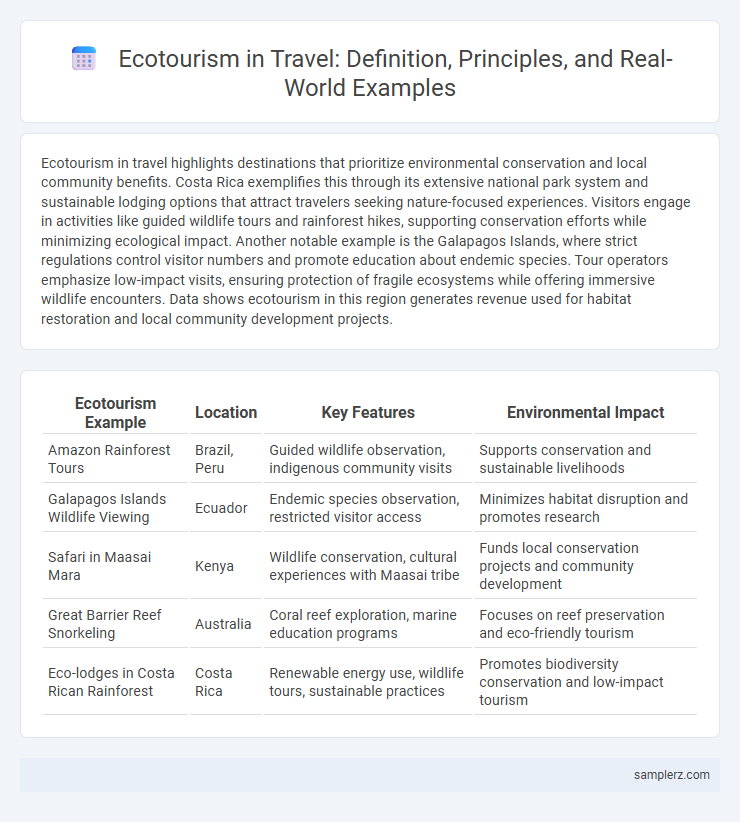Ecotourism in travel highlights destinations that prioritize environmental conservation and local community benefits. Costa Rica exemplifies this through its extensive national park system and sustainable lodging options that attract travelers seeking nature-focused experiences. Visitors engage in activities like guided wildlife tours and rainforest hikes, supporting conservation efforts while minimizing ecological impact. Another notable example is the Galapagos Islands, where strict regulations control visitor numbers and promote education about endemic species. Tour operators emphasize low-impact visits, ensuring protection of fragile ecosystems while offering immersive wildlife encounters. Data shows ecotourism in this region generates revenue used for habitat restoration and local community development projects.
Table of Comparison
| Ecotourism Example | Location | Key Features | Environmental Impact |
|---|---|---|---|
| Amazon Rainforest Tours | Brazil, Peru | Guided wildlife observation, indigenous community visits | Supports conservation and sustainable livelihoods |
| Galapagos Islands Wildlife Viewing | Ecuador | Endemic species observation, restricted visitor access | Minimizes habitat disruption and promotes research |
| Safari in Maasai Mara | Kenya | Wildlife conservation, cultural experiences with Maasai tribe | Funds local conservation projects and community development |
| Great Barrier Reef Snorkeling | Australia | Coral reef exploration, marine education programs | Focuses on reef preservation and eco-friendly tourism |
| Eco-lodges in Costa Rican Rainforest | Costa Rica | Renewable energy use, wildlife tours, sustainable practices | Promotes biodiversity conservation and low-impact tourism |
Top Destinations Showcasing Successful Ecotourism Initiatives
Costa Rica stands out as a top ecotourism destination, with its extensive national parks and protected rainforests promoting biodiversity conservation and sustainable travel. The Galapagos Islands offer unique wildlife encounters while implementing strict visitor limits to preserve fragile ecosystems. New Zealand's eco-lodges and guided tours emphasize environmental education and community involvement, making it a model for responsible tourism.
Unique Ecotourism Lodges Making a Difference
Unique ecotourism lodges like Costa Rica's Lapa Rios Lodge and Tanzania's Ngorongoro Crater Lodge are setting new standards in sustainable travel by integrating renewable energy, waste reduction, and wildlife conservation efforts into their operations. These lodges partner with local communities to support environmental education and biodiversity preservation, promoting responsible travel practices that directly benefit ecosystems and endangered species. By offering immersive experiences in pristine natural habitats, these ecotourism venues demonstrate how sustainable lodging can create positive ecological, cultural, and economic impacts.
Community-Based Ecotourism Models Around the World
Community-based ecotourism models, such as the Q'ero Indigenous Community in Peru, emphasize sustainable tourism that supports local economies and preserves cultural heritage. In Kenya, the Maasai Mara conservancy allows visitors to experience wildlife while profits fund community projects and wildlife conservation. Similarly, the Gili Eco Trust in Indonesia promotes coral reef protection through tourist engagement and local education initiatives.
Best Wildlife Conservation Tours for Responsible Travelers
Best wildlife conservation tours for responsible travelers include visits to the Galapagos Islands, where ecotourism supports endangered species preservation and habitat protection. In Botswana's Okavango Delta, guided safaris emphasize minimal environmental impact while benefiting local communities through sustainable tourism practices. Costa Rica's Monteverde Cloud Forest Reserve offers immersive experiences in biodiversity conservation, promoting protection of native flora and fauna while educating travelers on ecological sustainability.
Adventure Activities with Eco-Friendly Practices
Adventure activities in ecotourism often include hiking, kayaking, and wildlife safaris conducted with strict eco-friendly practices such as waste minimization and habitat preservation. Sustainable tour operators emphasize low-impact transportation and the use of biodegradable materials to reduce environmental footprints. These practices enhance the overall experience while supporting conservation efforts and local communities.
Cultural Encounters Shaped by Sustainable Touring
Ecotourism exemplifies cultural encounters by promoting sustainable touring practices that respect indigenous communities and preserve local traditions. Travelers engage authentically with cultural heritage sites, participating in community-led experiences that foster environmental awareness and social responsibility. These immersive journeys contribute to the conservation of cultural identity while supporting the economic vitality of local populations.
Protected Nature Reserves Pioneering Ecotourism
Protected nature reserves like Costa Rica's Corcovado National Park exemplify ecotourism by preserving biodiversity while offering sustainable wildlife viewing and guided rainforest hikes. These reserves adopt strict conservation measures to minimize human impact, supporting endangered species and promoting habitat restoration. Ecotourism initiatives in such protected areas generate local income and environmental awareness, creating a model for responsible travel.
Marine Conservation Experiences for Eco-Conscious Tourists
Marine conservation experiences offer eco-conscious tourists hands-on opportunities to participate in coral reef restoration, sea turtle monitoring, and coastal clean-up projects. Destinations such as the Great Barrier Reef, Galapagos Islands, and Palau provide sustainable travel options that promote ocean biodiversity and environmental stewardship. These immersive activities support local conservation efforts and raise awareness about marine ecosystem protection.
Green Transportation Options in Ecotourism
Electric bikes and solar-powered boats serve as prime green transportation options in ecotourism, minimizing carbon emissions while offering sustainable travel experiences. Destinations like Costa Rica and Norway promote electric shuttles and hybrid buses to reduce environmental impact in protected areas. These eco-friendly transit modes support conservation efforts by preserving natural habitats and reducing pollution during tourist activities.
Volunteer Travel: Contributing to Ecotourism Preservation
Volunteer travel exemplifies ecotourism by allowing travelers to actively participate in conservation projects such as reforestation, wildlife monitoring, and habitat restoration. Programs like marine turtle protection in Costa Rica and community-led forest conservation in Madagascar enable volunteers to contribute directly to preserving biodiversity. These initiatives promote sustainable tourism practices while fostering environmental stewardship and cultural exchange.

example of ecotourism in travel Infographic
 samplerz.com
samplerz.com